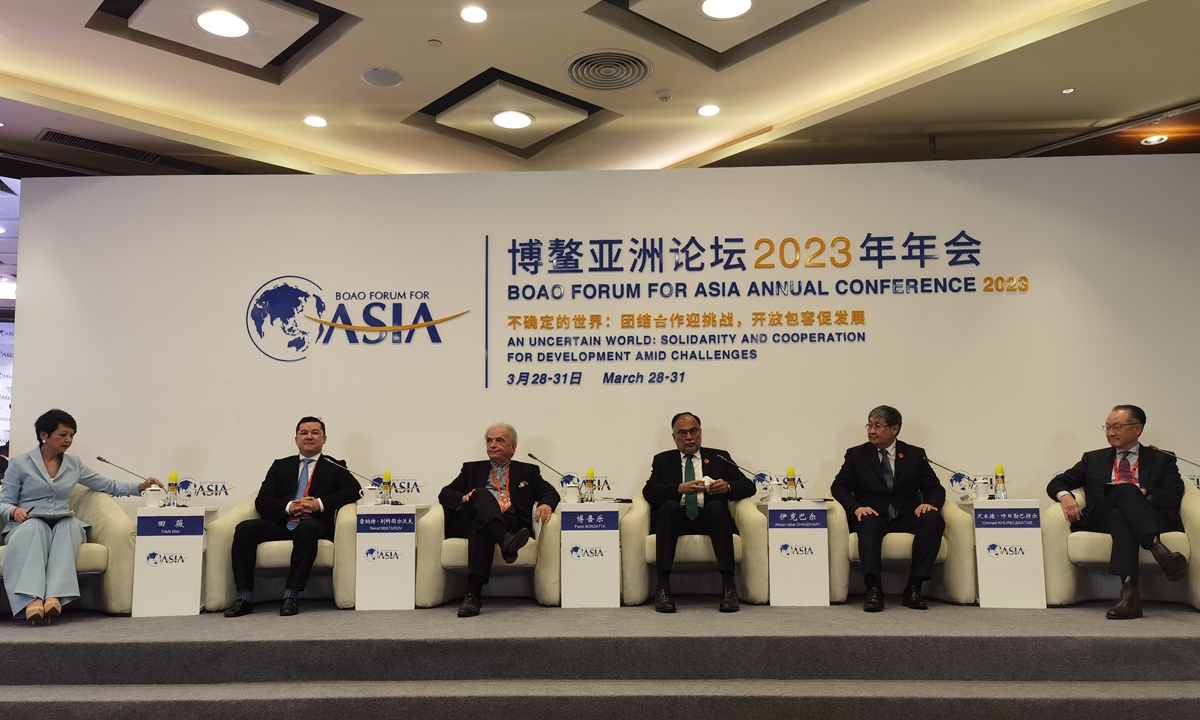
International observers attend a session themed "Belt and Road: Sharing the opportunities of development" at the Boao Forum for Asia Annual Conference 2023 in Boao, Hainan Province on March 28. Photo: Wang Wenwen/GT
The real beauty of the China-proposed Belt and Road Initiative (BRI) is the idea of sharing, and the BRI is of in-depth vision, international observers said on Tuesday at a panel session of the ongoing Boao Forum for Asia.
Calling the BRI the most ambitious development project in human history, Jim Yong Kim, partner and vice chairman of Global Infrastructure Partners and 12th president of the World Bank Group, said the essence of the BRI is to have a way of shoring up infrastructure foundation to let everyone aspire to enjoy a good life.
The session, themed "Belt and Road: Sharing the Opportunities of Development," aimed to look back at the achievements of the BRI in the past 10 years and discuss cooperation opportunities amid global geopolitical and economic challenges. Panelists at the session are from the US, Kazakhstan, Italy, Mongolia and Pakistan.
Launched in 2013, many development and investment projects under the BRI were devised to link Asia and Europe through infrastructure. In the decade since, the project has expanded to Africa, Oceania and Latin America and brought enormous growth opportunities to partner countries.
Chimed Khurelbaatar, deputy prime minister and minister of economy and development of Mongolia, expected Mongolia to export more coal to China this year and broader cooperation opportunities between the two countries under the BRI.
Renat Bekturov, governor of the Astana International Financial Centre, said that infrastructure projects under the BRI are not just about moving goods, but also about the economic development of his country, Kazakhstan.
The COVID-19 pandemic did not affect experts' confidence in the BRI. At the panel session, they came up with ideas of how to further enhance cooperation under the initiative.
Paolo Borzatta, a board member of Milan-based European House-Ambrosetti, reminded the audience that Italy was the first G7 country to join the BRI and suggested that a database of all BRI activities be built so that companies interested in investing and doing business know where they can turn to.
Kim from Global Infrastructure Partners said it is time to be more "open and aggressive" about partnerships.
"The entry of the private sector will be helpful in enhancing the sustainability of a project, because it gets to look very hard whether or not the project actually makes money. That kind of discipline could be part of the BRI and ensure the success of projects," said Kim.
At Tuesday's session, experts also debunked claims that China deliberately pursues "debt trap" diplomacy to project political influence.
China's Foreign Ministry spokesperson Mao Ning said on Tuesday that China opposes certain forces that hype the "debt trap" and non-transparency of loans.
The comment followed a report by researchers from the World Bank, Harvard Kennedy School, AidData and the Kiel Institute for the World Economy. The report said that China spent $240 billion bailing out 22 developing countries between 2008 and 2021, with the amount soaring in recent years as more struggled to repay loans that were spent building BRI projects.
Palestinian Ambassador to China Fariz Mehdawi told the Global Times in a previous interview that the "debt trap" concept is a conspiracy.
"I don't believe in something called the debt trap, because the whole concept assumes that somebody is intelligent and the other is stupid. All nations in the world are mature and they are able to define their priorities.
"These transactions and deals between countries are made after thorough discussions by both sides. The recipient and the contributor work as partners with a clear vision on how it's going to work. There is shared responsibility," said Mehdawi.




